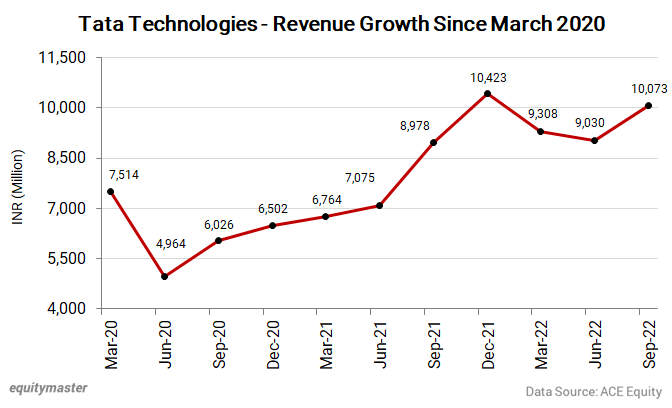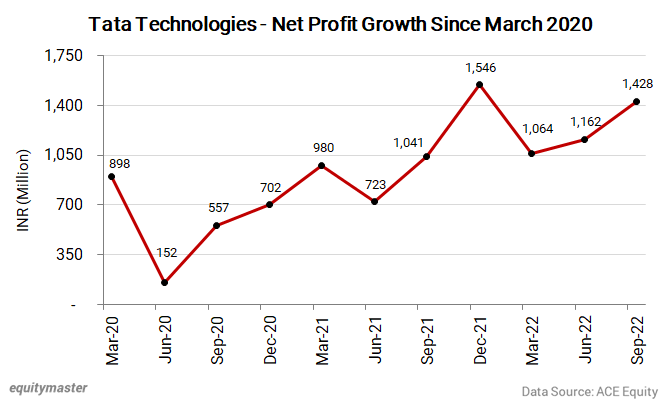India's Third Giant Leap
This Could be One of the Biggest Opportunities for Investors
- Home
- Views On News
- Jan 19, 2023 - Tata Technologies: The Next TCS?
Tata Technologies: The Next TCS?

Editor's note: The Tata group has been around for more than 150 years, and it is considered one of the most respected and trusted business groups in India.
After almost 18 years, the group is coming out with an IPO (initial public offering). The group has initiated the process for the same and has hired two advisors to list Tata Technologies.
It has not yet announced a date for the Tata Technologies IPO, but this IPO coming up is expected to be one of the most popular in recent years, and that's why it is getting so much attention and hype.
The company will raise somewhere between Rs 35-40 billion (bn), giving it a valuation of Rs 162-200 bn, according to reports.
The IPO will allow the company to raise capital from the public, which can be used to fund expansion and growth plans. It also provides an opportunity for the public to invest in the company, which can be seen as a sign of confidence in the company's future prospects.
Continue reading to know more about Tata Technologies IPO and what the future has in store for the company.
Tata Technologies: The Best Kept Secret of the Tata Group
- "If history repeats itself, I should think we can expect the same thing again." - Terry Venables
Tata Consultancy Services (TCS) made a stellar debut on the stock exchanges in 2004, listing at a premium of 27% to its issue price of Rs 850.
But what happened ever since is the stuff that dreams are made of.
The company has declared 3 bonus issues of 1:1 in 2006, 2009, and 2018, meaning a holding of 100 shares by an investor would have gone up to 800.
After taking these bonuses into consideration, an investor who invested Rs 85,000 for 100 shares at the time of the IPO at the issue price of Rs 850, would have seen the value of his investment increase to Rs 2.6 million (m) (Rs 26 lakhs), a gain of 3,000% till date.
And that's not all. The company has rewarded shareholders with tens of billions of rupees in dividends and buybacks over the years.
The market cap of the stock which stood at Rs 472 bn (Rs 47,200 crores) on listing has gone on to become Rs 12 trillion (tn) (Rs 12 lakh crores) making TCS the second most valuable company in India.
This has made TCS one of the greatest investment opportunities of our times, multiplying wealth for its shareholders.
Ever since, the company's shareholders as well as those who missed out on this life changing opportunity have been waiting with bated breath for the Tata group to launch another IPO of one of its many unlisted companies.
It seems the wait is finally over after 18 long years. On 12 December 2022, the Tata Motors' board accorded, in principle, a partial divestment in Tata Technologies, its wholly owned subsidiary, through an IPO.
It looks like Tata Technologies could rollout its IPO in 2023 and the buzz around it is getting louder by the day with some investors calling it the best kept secret of the Tata group.
In August 2021, Tata Technologies was trading at Rs 2,800 per share in the unlisted shares market. The price has jumped 130% over the last year to over Rs 6,500 per share.
So, will Tata Technologies live up to all the hype? Will it be the next Tata group multi-bagger? Or are investors getting carried away based on the success of the group's last big IPO.
Let's take a closer look at the company and try to identify and capture its key takeaways.
Tata Technologies: What Exactly does it Do?
Tata Technologies provides engineering and development services, digital enterprise services, product lifecycle management, education offerings, and IT service management to businesses across automotive, aerospace, industrial machinery, and other industries.
With over 10,000 employees and 18 global delivery centres, the company serves customers in 27 countries across North America, Asia-Pacific, and Europe.
Simply put, Tata Technologies works with manufacturing companies to bring their ideas to life.
For instance, back in 2004, Ratan Tata, Chairman Emeritus of the Tata group, dreamt of offering the comfort and relative safety of a car to users who can afford a two-wheeler.
This dream was realised with the launch of Tata Nano in 2008, the world's most affordable production vehicle ever built.
But what is perhaps unknown is that the former Tata Group chairman brought together four engineers to make it happen. Only one of them was from Tata Motors, the group's main automotive arm.
The remaining three came from Tata Technologies, that engineered and designed the Tata Nano and helped Mr. Tata's dream become a reality!
Typically, Tata Technologies works with a client by offering the right kind of solution which can enhance the company's profitability. It does this through its three services - enablement, business value realization, and transformation.
Using its deep understanding of engineering principles and technologies, the company combines traditional engineering and modern digital technology to transform good ideas into real and sustainable products.
The company covers every aspect of the value chain starting from product conceptualization to aftermarket maintenance repair, and operations.
Tata Technologies, headquartered in Pune, India was founded as a business unit of Tata Motors in 1989. Tata Motors has a 74.42% stake in Tata Technologies, according to the company's 2022 annual report.
Tata Technologies: The Plant that Grew into a Tree, a Tree into a Forest
- "Tata Technologies is a young company in a very exciting line of business. We decided that this company would not be all things to all people but would focus on the niche area of providing solutions to manufacturing companies. I would like to see Tata Technologies being acclaimed as one of the more innovative and successful design companies in the world."
Mr. Ratan Naval Tata
Chairman Emeritus of the Tata Group
The world as we know it is changing. We are fast transitioning toward an autonomous, connected, electric and shared future.
And just like we, as people, struggle to embrace these rapid technological changes, so too do organizations.
This is where a company such as Tata Technologies comes into play by being an engineering partner which can help companies navigate new challenges and transform them to thrive in the new normal.
From delivering discrete outcomes to end-to-end product development, the company has the requisite experience and expertise to understand what is needed to help manufacturing companies realize their goals faster.
Automotive Industry
Technology has become the single biggest driver of change in companies today and as a leading global product engineering and digital transformation specialist, Tata Technologies is well prepared to help original equipment manufacturers (OEMs) navigate their future and thrive.
Whether a manufacturer wants the company to support them on product concept designing or manufacturing or end-to-end full vehicle design, Tata Technologies has a portfolio to meet all their requirements.
The automobile industry is expected to be fundamentally disrupted over the next decade as new megatrends emerge around the adoption of electric vehicles (EV).
Traditionally, the automotive industry involved vertical integration, where the supply chain is closely controlled by the automaker.
But that model, is undergoing a major transformation with the emergence of new platforms, like the electric car and autonomous vehicles, which demand a different manufacturing approach.
Going forward, the supply chain could evolve into more of an ecosystem where companies such as Tata Technologies could become an integral part of the value chain.
As manufacturers continue to scale up their electric vehicle operations, the company has kept pace by accelerating the speed of automotive technology innovations, with brand new electric, connected, autonomous, and shared mobility concepts.
Over the last couple of years, the company innovated end-to-end turnkey product development solutions as well as accelerators that are being leveraged by traditional OEMs as well as start-ups to launch competitive products faster.
In 2020, the company tied up with GKN Automotive, a global leader in driveline systems and advanced ePowertrain technologies. It opened a global e-mobility software engineering centre in Bengaluru in October 2020.
This tie up is a significant development for the company as over 50% of EVs sold globally use parts manufactured by GKN. Tata Technologies will develop software and embedded electronics as part of the tie-up.
As battery-powered electric vehicles will grow in popularity and market share during the next decade, Tata Technologies is in a sweet spot to make the most of this EV megatrend.
Aerospace Engineering
In the aerospace segment, the company's engineering and design services provide clients with the capacity to innovate new products components, interiors, and maintenance.
Tata Technologies is a preferred partner for leading aerospace OEMs providing continuous engineering support, core product design and development, manufacturing engineering, embedded systems, product lifecycle management, and enterprise solutions.
In FY2022, Tata Technologies was selected by Airbus as an engineering, manufacturing engineering and services strategic supplier to collaborate across multiple areas and geographies.
With this, the company is looking at scaling up its presence in France, Germany, and Spain in the coming years.
Tata Technologies is also working on modernising Air India's operations by digitising its fleet and equipment data and introducing digital solutions for aircraft maintenance as the Tata Group moves to revive the country's oldest airline.The company has set a goal to make the aerospace business its second biggest revenue earner after automobiles.
Industrial Heavy Machinery
Tata Technologies helps industrial heavy machinery manufacturers explore new lines of revenue and ways to bring new products faster to market, reduce operating costs by bringing in supply chain resiliency, and enhance the customer experience to stay ahead of the competition.
The company has a portfolio of solutions that leverages the full value of a technology-driven workflow to enable customers to get products that are faster, better, and cost-effective.
Tata Technologies' advanced manufacturing portfolio comprises services and solutions for enabling lean manufacturing and improving manufacturing efficiency & productivity. This includes prototyping and tooling, production, testing, quality assurance, and operational efficiency.
Education Offerings
Companies across the globe have begun to recognize the need for digitization of their employees. Tata Technologies' 'Education Competency Centre' offers students a learning facility to prepare themselves with industry-relevant skills and competencies.
It offers tools, practices, and techniques, across various types of courses to help students enhance their skills through experiential learning and bridge the gap between academia and industry.
The company's iGET IT, an eLearning platform for corporates and individuals is based on the blended learning methodology that offers 2000+ self-paced courses and niche skill sets. The platform is widely used and preferred by more than 500,000 members worldwide to meet their learning goals across 60 countries.
It is evident that no matter which industry it is present in, Tata Technologies is a specialist rather than a generalist which ensures that its offerings are irreplaceable and would continue to remain in high demand over the long term.
Tata Technologies: The Numbers Don't Lie
For the year ended March 2022, Tata Technologies revenue was seen at Rs 358 bn, along with an operating profit of Rs 69.4 bn and profit after tax of Rs 43.7 bn. The year saw a revenue growth of 47%, operating profit growth of 65%, and profit after tax growth of 74%.
2022 was the best financial year in the history of the company. Tata Technologies is a zero-debt company. However, if we look back at the last 5 years, the growth in revenues and profits hasn't been consistent.
Tata Technologies Ltd - Financials Over the Last 5 Years
| Particulars (Rs in m) | FY 2018 | FY 2019 | FY 2020 | FY 2021 | FY 2022 |
|---|---|---|---|---|---|
| Total Income | 27,797.6 | 29,864.3 | 28,969.4 | 24,327.5 | 35,856.2 |
| Growth | -2.1% | 7.4% | -3.0% | -16.0% | 47.4% |
| Operating Profit | 4,209.9 | 5,470.9 | 5,153.3 | 4,305.4 | 6,944.4 |
| Operating Profit Margin | 15.1% | 18.3% | 17.8% | 17.7% | 19.4% |
| Net Profit | 2,458.1 | 3,526.0 | 2,515.5 | 2,391.8 | 4,369.7 |
| Net Profit Margin | 8.8% | 11.8% | 8.7% | 9.8% | 12.2% |
| Total Debt | 673.7 | 0.0 | 0.0 | 0.0 | 0.0 |
Revenues which grew 7.4% year on year for the financial year ended March 2019 declined 3% and 16% respectively in FY2020 and FY2021.
But this could be attributed to the uncertainties regarding trade relations between the USA and China as well as an unresolved Brexit which prompted most of the company's automotive customers to deploy major cost cutting programs in 2020.
Similarly, in the financial year 2020-2021, the pandemic hit the company hard as customers in not just the automotive industry but also in aerospace and industrial heavy machinery, cut costs to protect their own viability.But since then, the company has rebounded with revenues consistently growing over the last few quarters rising from as low as Rs 4,964 m in June 2020 to Rs 10,070 m in the quarter ended 30 September 2022.

Similarly, Net Profit has also kept pace with revenues jumping 839% from Rs 152 m reported in June 2020 to Rs 1,428 m for the quarter ended 30 September 2022.

Tata Technologies' revenue is expected to grow 69% to Rs 60 bn by 2025, up from Rs 35.8 bn during 2021-22, driven by an increase in demand in the electric vehicle space and its thrust in the aviation industry.
According to Warren Harris, managing director and chief executive officer of Tata Technologies, the company expects business to grow 20% in FY 2023 and at 15% CAGR after that for the next few years.
The company is also looking at growth through mergers and acquisitions by actively scouting for targets, particularly in an effort to expand its defence footprint.
With over Rs 12 bn on its balance sheet, the company has the ability to invest where it is required to accelerate its growth.
In the past, over 75% of the business was dependent on Tata Group, particularly JLR and Tata Motors (captive accounts). But, over the last five years, the company has worked hard to improve the non-captive share.
One of the key aspects of the stupendous growth in revenue in 2022 is that it has been driven by accounts outside of Tata Motors and JLR. Non-captive account revenue contribution has increased from 46% in FY20 to 64% in FY22, allowing Tata Technologies to de-risk its excessive reliance on captive accounts.
The company is also looking at increasing its non-automotive share from 12% currently to 18% over the next 3 years by vying for business in other sectors including aerospace and industrial machinery.
In anticipation of its goals and significant growth, the company has already announced plans to hire 5,500 people over the next 3 years. This would expand its headcount by 58% to 15,000 by 2025.
Tata Technologies developed its first EV in 2012. Over the last 10 years, it has invested in building skills and intellectual property on EV technology.
Armed with this strong experience, the company has built strong relationships with some of the most progressive automotive companies in the world. This has set up Tata Technologies in a relatively unique way.
With the evolution in the electric vehicle sector, it is likely to witness strong tailwinds in the years ahead, making Tata Technologies a potential investment opportunity for long term investors.
It remains to be seen, what portion of its stake, Tata Motors might offer in the company and at what valuation.
But it does seem like Tata Technologies may be at the right place at the right time prompting the Tata group to launch its IPO.
If offered at a reasonable valuation, it could be prudent for investors to subscribe to this IPO for the long term.
Investment in securities market are subject to market risks. Read all the related documents carefully before investing
Out Now
3 High Conviction Stocks
Chosen by Rahul Shah, Tanushree Banerjee and Richa Agarwal
Report Available
Details of our SEBI Research Analyst registration are mentioned on our website - www.equitymaster.comDisclaimer: This article is for information purposes only. It is not a stock recommendation and should not be treated as such. Learn more about our recommendation services here...

Yazad Pavri
Cool Dad, Biker Boy, Terrible Dancer, Financial writer
I am a Batman fan who also does some financial writing in that order. Traded in my first stock in my pre-teen years, got an IIM tag if that matters, spent 15 years running my own NBFC and now here I am... Writing is my passion. Also, other than writing, I'm completely unemployable!


Equitymaster requests your view! Post a comment on "Tata Technologies: The Next TCS?". Click here!
Comments are moderated by Equitymaster, in accordance with the Terms of Use, and may not appear
on this article until they have been reviewed and deemed appropriate for posting.
In the meantime, you may want to share this article with your friends!